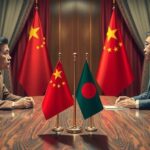Politics
ABBAS, ASIA, BANGLADESH, BEIJING, BILATERAL COOPERATION, BILATERAL RELATIONS, BILATERAL TRADE, CHINA, CN, CNA, DHAKA, DIPLOMACY, EAST PAKISTAN, ECONOMIC COOPERATION, HASINA, INDIA, INDIA STUDY CENTRE, INSTITUTE OF STRATEGIC STUDIES, INSTITUTE OF STRATEGIC STUDIES ISLAMABAD, ISLAMABAD, MEXICO, MUHAMMAD YUNUS, NEW DELHI, NORTH AMERICA, PAKISTAN, SHEIKH HASINA, SOUTH ASIA
Nia Simpson
Improving Ties: Bangladesh Celebrates Independence Against a New Diplomatic Horizon with Pakistan
Bangladesh and Pakistan have resumed direct trade, marking a significant thaw in relations strained since 1971. Political changes in Bangladesh have enabled renewed diplomatic ties and economic cooperation. Experts indicate that the evolving dynamics could reshape regional interactions, particularly with China’s growing influence. The future will be critical as both nations solidify their partnerships in trade and security.
Bangladesh recently celebrated its independence anniversary amidst improving relations with Pakistan. For the first time in over 50 years, both nations resumed direct trade, with Bangladesh importing 50,000 tonnes of rice from Islamabad. Their relationship has been historically strained since Bangladesh’s independence from Pakistan in 1971 after a significant war.
Political changes in Bangladesh, particularly the ousting of former Prime Minister Sheikh Hasina, have led to thawing relations between Dhaka and Islamabad. The two countries have restored their diplomatic ties, reestablished flight connectivity, and initiated high-level military cooperation. Pakistan’s Foreign Minister Ishaq Dar plans to visit Dhaka next month to further these developments.
Experts view the warming relations as an opportunity to reshape South Asia’s regional dynamics. Khurram Abbas from the Institute of Strategic Studies Islamabad remarked that anti-Hasina sentiments may provide Pakistan with a significant window of opportunity to strengthen ties with Bangladesh for the next five to ten years.
Bangladesh’s previous alliance with India was primarily influenced by Hasina, who held office for 15 years. Following her removal, the new government has distanced itself from India, citing New Delhi’s support for Hasina’s regime, a claim India has denied. This shift has coincided with China’s increasing involvement in the region, prompting closer ties between Pakistan and Bangladesh.
As Bangladesh marks 50 years of diplomatic relations with China, Chief Advisor Muhammad Yunus is scheduled for his inaugural bilateral visit to China. His Special Envoy indicated an agenda laden with significant meetings and a keynote address at the Boao Forum for Asia 2025.
The economic cooperation between Bangladesh and Pakistan is becoming crucial, especially as both nations explore mutual markets. Some analysts believe improved relations could also present opportunities for India through potential transit trade and enhanced value chains among the three countries. The coming years will be pivotal as both nations work to establish a robust partnership across trade, security, and diplomacy.
In conclusion, the recent improvements in Bangladesh-Pakistan relations symbolize a potential shift in South Asian geopolitics. The renewed diplomatic ties and economic collaborations present opportunities for mutual growth. As both nations navigate their newly established partnership and solidify cooperative measures, these developments may lead to an evolving regional dynamic that also impacts India.
Original Source: www.channelnewsasia.com








Post Comment